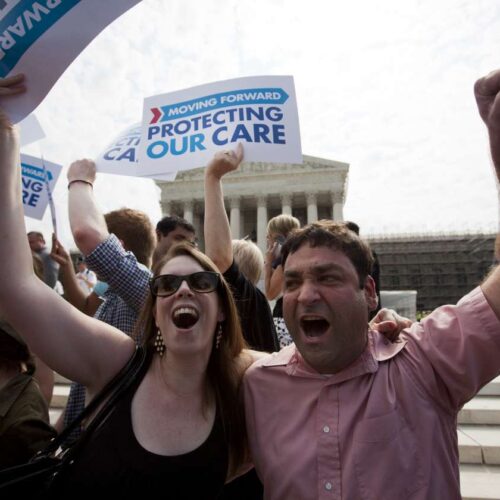Introduction
As I was waiting anxiously for today’s Supreme Court decision, I knew there was a man in Colorado I’d met on the first anniversary of the Affordable Care Act who was likely far more anxious than I was.
I do not recall the man’s name, but I have kept him in mind in the months since he came up to the podium to tell me after I spoke to an audience in Denver that he knew he was alive that day because of the new law. To me, he came to represent the thousands of Americans whom I know can truthfully say that they probably would be in their graves if not for ObamaCare.
That man was among millions of people in this country who insurance companies have labeled “uninsurable,” meaning they could not buy insurance coverage at any price because of pre-existing conditions. One of the most important provisions of the law that was upheld by the Court today was the one that will take effect on January 1, 2014, the one that will at long last make it illegal for insurers to refuse to sell coverage to people who have been sick in the past.
Knowing that 2014 was too far in the future for people to wait, Congress included in the reform law funding to help states create or expand high-risk pools to cover millions of people whom insurance companies for years wouldn’t touch with a 10-foot pole. That man was among those millions who were finally able to buy coverage that gave them access to life-saving care.
While many political pundits and columnists will be focusing on how the decision will affect the political fortunes of Barack Obama and Mitt Romney and just about every candidate for Congress, I plan over the coming weeks to focus on the people who already are or will soon be benefiting from the law. That frankly includes members of my own family. My 25-year-old daughter, who has not been able to find a job that offers health benefits, was able to get back on our family policy because of the law. My mother, now 87, is not having to spend as much on her medicines because the law has already begun closing the hated doughnut hole in the Medicare prescription drug benefit. And the law even affects my wife and me and millions of other baby boomers like us. We both also have to take medications and, as a consequence, undoubtedly would be among the ranks of the “uninsurable” if we lost our employer-sponsored coverage.
The law is expected to bring 30 million of the 50 million uninsured Americans into coverage when it is fully implemented. It is not perfect by any means, but it represents the most comprehensive health care reform law in this country’s history. What we will see in the coming months will be attempts to weaken the consumer protections in the law, and I know the industry I worked for over two decades will be at the center of those efforts. Advocates of reform will have to be on guard to make sure those consumer protections live on.
For Monday, I will write about what we can expect from the insurance industry in the months ahead. And I will write about other people, like that man in Colorado, who likely will be able to live a longer life, thanks to ObamaCare.
Read more in Health
Health
2 paths forward for uninsured, 1 clouded by ruling
Wendell Potter commentary
OPINION: Translating the insurance industry’s feel-good rhetoric
Focus group bromides obscure real intentions


Join the conversation
Show Comments